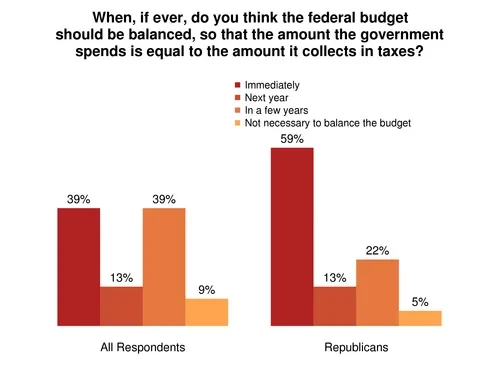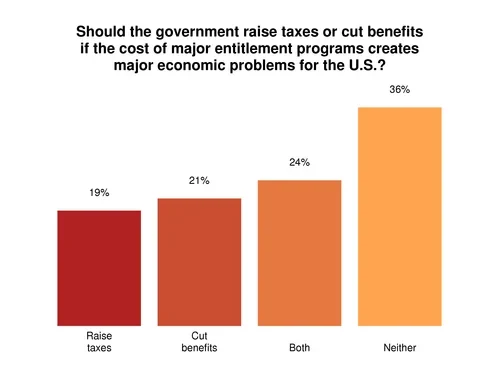Americans, like the chairs of the Deficit Reduction Commission, agree that the deficit is a serious problem. Nearly nine in ten say they are personally concerned about its size. But unlike the leaders of the Commission, they find many of the proposed fixes unpalatable. In the latest Economist/YouGov poll, most reject those solutions that could impact their own lives – and pocketbooks.
In fact, 38% of Americans – and 55% of Republicans – want to balance the budget immediately. Four in ten are willing to wait a few years. But only 10% think balancing the budget is unnecessary.

But there is no consensus on how to do it. 35% believe the budget can be balanced by 2037 simply by making the government more efficient. And while differences between Republicans and Democrats on this are relatively small, nearly half of those 65 and older and people who call themselves conservatives think greater efficiency in government can make the difference. One in three admits that it will take spending cuts and/or increases in taxes to make the difference. One in five aren’t sure.

Most Americans – perhaps because many think efficiency alone is necessary – reject some solutions proposed by Commission Chairs Erskine Bowles and Alan Simpson, even when many of their proposals would not go into effect for decades. By 41% to 28%, Americans reject raising the full retirement age for collecting Social Security benefits to 69 by 2075 – a change that would NOT personally impact any of those interviewed in this poll. Majorities reject raising the gas tax 15 cents in 2013, eliminating the mortgage interest deduction, and reducing Medicare payments to doctors and other medical providers. Pluralities reject reducing Social Security Cost of Living Adjustments by changing the formula for calculating them, and eliminating tax deductions for companies providing health insurance for their employees.
Americans ARE willing to cut the number of federal employees by 10%, cutting defense spending by $100 billion, and (by a smaller margin) limiting the ability to sue for medical malpractice damages. And most are willing to lift the earnings caps for collection Social Security taxes to cover all earnings.
Do you favor or oppose the following measures to reduce the federal deficit, or the amount by which federal expenditures exceed revenues each year
| Favor | Neither favor, nor oppose | Oppose | Not sure | |
|---|---|---|---|---|
Gradually raising the retirement age for full Social Security benefits to 69 by 2075 | 30% | 18% | 41% | 11% |
Eliminating the tax deduction to homeowners for interest paid on their mortgages | 18% | 17% | 50% | 14% |
Eliminating the tax deduction that companies take for providing health insurance to their employees | 16% | 19% | 51% | 14% |
Cutting defense spending by $100 billion | 44% | 17% | 27% | 12% |
Gradually raising the gas tax by 15 cents per gallon starting in 2013 | 19% | 13% | 60% | 8% |
Reducing the size of the federal work force by 10% | 53% | 18% | 15% | 13% |
Reducing Medicare payments to doctors, other health care providers, and drug companies | 21% | 17% | 49% | 13% |
Limiting the ability of people to sue for damages in cases of medical malpractice | 41% | 20% | 26% | 13% |
Reducing cost-of-living adjustments for Social Security benefits by changing the inflation measurement used to calculate adjustments | 17% | 18% | 46% | 18% |
Lifting Social security payroll tax cap so that Social Security taxes are paid on all income, not just income under $106,000 | 54% | 12% | 18% | 17% |
Republicans are just about as unwilling to change most of these policies as Democrats are, though more Republicans favor setting limits on malpractice claims and two in three would cut the federal workforce. But 49% of Republicans reject cutting the defense budget. Those 65 and older are particularly upset at potential changes in Social Security benefits.
Americans clearly recognize that Social Security and other entitlement programs will create economic problems in the next 25 years if nothing is done. 57% say it will, and just 20% say it won’t. But, like their leaders, they have no easy or popular solution. One in five would cut benefits, one in five would raise taxes, one in five would do both. But more than a third would do neither.

More Democrats favor raising taxes than cutting benefits, while Republicans take the opposite view. And as for those 65 and older, nearly half favor neither solution.
There is little public confidence that Social Security can survive. Most American and NOT confident that they will have sufficient income in retirement, will be able to retire when they want to, and will get the Social Security benefits they expect.
How confident are you about the following things
| Confident | Not confident | |
|---|---|---|
You will have sufficient income throughout your retirement | 25% | 75% |
You will be able to retire when you want | 40% | 60% |
The Social Security system will be able to pay your full benefits throughout your retirement | 24% | 76% |
Throughout your retirement, the Social Security system will provide benefits of at least equal value to what it pays out today | 24% | 76% |
Even many of those 65 and older, who are a little more confident in Social Security than younger people, have doubts.







